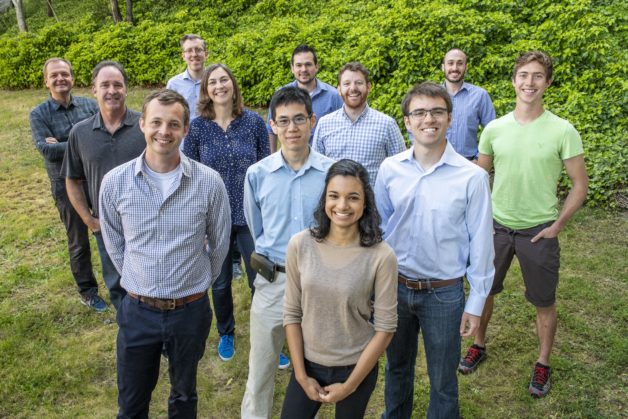
Cyclotron Road, an entrepreneurial technology fellowship program based in Berkeley, CA, announced its fourth cohort today. Comprising 13 PhD-level scientists and engineers, these fellows will spend the next two years embedded at the U.S. Department of Energy’s Lawrence Berkeley National Laboratory (Berkeley Lab), advancing their technology innovations from promising concepts to first products. While their areas of expertise range from clean power generation to electronics to material science and manufacturing, all share a common desire to apply their respective technologies toward creating positive societal impacts.
“We rigorously evaluated applications from over 175 scientific innovators from around the world, and this group represents the best of the best,” says Cyclotron Road founder Ilan Gur. “Bringing a new cohort into the program is always exciting, and the diversity of experience and expertise among Cohort 4 will help amplify the efforts and reach of our entire community of innovators, who are delivering new technologies to the world.”
Founded in 2014, Cyclotron Road has pioneered a new fellowship model to support scientists and engineers as they bring promising concepts toward a first product. Through a partnership with Berkeley Lab, Cyclotron Road fellows receive access to sophisticated, rare, or one-of-a-kind laboratory equipment and opportunities to collaborate with leading Berkeley Lab scientists in their respective fields of study. They also learn about commercializing their products, raising capital, building a business case, and committing to the life of an entrepreneur.
From new, unconventional and economical paths to grid-scale energy storage and geothermal energy generation, to technologies that could change how humans interact with machines and how engines produce power, the projects that Cohort 4 fellows are pursuing hold tremendous promise to address urgent needs in a number of industrial sectors. The fellows and their projects are listed below.
Cyclotron Road Cohort 4:
Erkan Aktakka: ActiveMEMS is developing a microfabrication technology that integrates high-quality piezoelectric materials into micro-electro-mechanical systems (MEMS) for high-performance transducers, such as energy-harvesters for machine health monitoring networks.
Justin Briggs and Andrew Ponec: Antora Energy is building a grid-scale energy storage system that uses thermophotovoltaic energy converters to generate power from heat stored in inexpensive thermal materials.
Alexei Marchenkov: Bleximo is building first-generation quantum computing systems to address real-world needs, such as simulating the electronic and chemical properties of new materials and drug molecules, that are often too complex for conventional computers.
Jill Fuss and Steve Yannone: CinderBio harnesses the power of enzymes that can withstand very high temperature and acidic environments for industrial applications.
Tim Latimer and Jack Norbeck: Fervo Energy is developing cost-effective, clean energy from geothermal resources using novel drilling techniques based on research of mixed-mechanism stimulation.
Miguel Sierra Aznar: Noble Thermodynamic Systems has developed a closed-loop internal combustion engine cycle that uses a monatomic gas and gas separation unit to efficiently deliver emission-free electricity from natural gas or stored hydrogen.
Christopher Graves: Noon Energy is pioneering a new class of flow battery technology that enables economical long-duration energy storage, designed to enable intermittent renewable electricity sources such as solar and wind to meet continual demand.
Dominic Labanowski and Nishita Deka: Sonera Magnetics is developing a portable, room-temperature magnetometer with performance comparable to the best magnetic sensors available today. This will enable a range of applications, from medicine to defense to brain-computer interfaces.
Kevin Kung: Takachar is developing small-scale, low-cost, and portable equipment that can turn agricultural and forestry wastes into fuels or chemicals, using a process called torrefaction.
Cyclotron Road is managed as a partnership between Berkeley Lab and Activation Energy, an independent nonprofit organization. It is supported by the U.S. Department of Energy’s Advanced Manufacturing Office as one of three Lab-Embedded Entrepreneurship Programs, by the California Energy Commission, and by Defense Advanced Research Projects Agency (DARPA), along with a number of the world’s most influential corporations and philanthropies.
Go here to read a Cyclotron Road news release with more information.
###
Lawrence Berkeley National Laboratory addresses the world’s most urgent scientific challenges by advancing sustainable energy, protecting human health, creating new materials, and revealing the origin and fate of the universe. Founded in 1931, Berkeley Lab’s scientific expertise has been recognized with 13 Nobel Prizes. The University of California manages Berkeley Lab for the U.S. Department of Energy’s Office of Science. For more, visit www.lbl.gov.
DOE’s Office of Science is the single largest supporter of basic research in the physical sciences in the United States, and is working to address some of the most pressing challenges of our time. For more information, please visit science.energy.gov.
